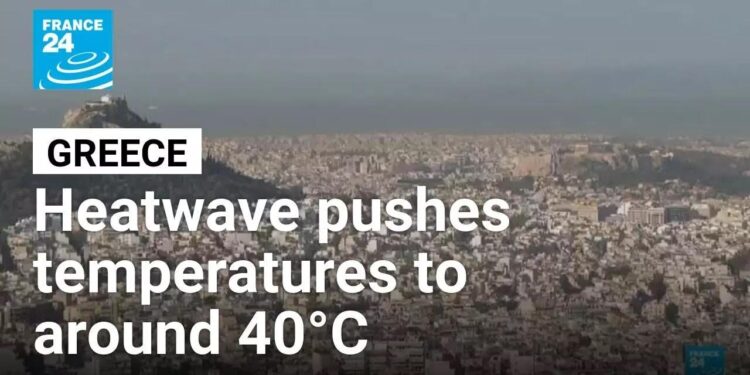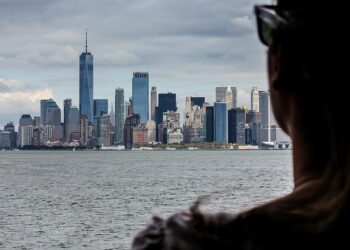As a scorching heatwave sweeps across Greece and the Balkans, both tourists and local labourers are confronting oppressive temperatures that test endurance and daily routines. Communities in the region are grappling with soaring heat levels that have disrupted travel plans, strained infrastructure, and heightened health risks, prompting urgent calls for relief measures and adaptation strategies. This article examines the widespread impact of the heatwave, the challenges faced by those on the frontlines, and the responses underway to provide respite amid the relentless summer blaze.
Heatwave Intensifies Across Greece and Balkans Disrupting Daily Life and Work
Temperatures soaring past 40¬įC in many parts of Greece and the Balkans have forced locals and visitors alike to adapt quickly to the sweltering conditions. Beach resorts, typically bustling with tourists, saw a noticeable shift as sunbathers sought shade during peak hours. Outdoor laborers faced heightened health risks, prompting employers to implement early morning shifts and mandatory breaks to prevent heat-related illnesses. Emergency services issued warnings about dehydration and heat stroke, while municipal authorities extended the operating hours of public cooling centers to provide relief for vulnerable populations.
Disruptions are being felt across critical sectors as well. Transport schedules are being adjusted due to heat-induced track and road damage, and smaller businesses are reporting decreased foot traffic during the afternoon heat. Below is a snapshot of temperature readings and their impacts in key affected cities:
| City | Max Temperature (¬įC) | Impact |
|---|---|---|
| Athens | 43 | Public pools overcrowded; power demand spikes |
| Belgrade | 41 | Transport delays; outdoor market closures |
| Thessaloniki | 42 | Increased hospital admissions for heatstroke |
- Tourists advised to stay hydrated and avoid midday sun.
- Worksites modifying schedules to ensure safety.
- Cities intensifying public health campaigns.
Vulnerable Populations Face Heightened Health Risks Amid Soaring Temperatures
As temperatures soar across Greece and the Balkans, certain groups find themselves disproportionately affected by the relentless heatwave. Elderly residents, children, and individuals with pre-existing medical conditions are at elevated risk of heat-related illnesses such as heat exhaustion and heatstroke. With limited access to cooling facilities and hydration, vulnerable populations are grappling with the physical toll of prolonged exposure to extreme heat.
Frontline labourers, particularly those working outdoors in construction and agriculture, face compounded dangers. These workers often endure long hours under the blazing sun, confronting dehydration and fatigue. Authorities have issued advisories highlighting critical precautions, including:
- Regular hydration breaks to prevent dehydration
- Use of protective clothing and shade to reduce sun exposure
- Monitoring for signs of heat stress and ensuring immediate medical assistance
| Group | Primary Risk | Recommended Action |
|---|---|---|
| Elderly | Heatstroke | Stay indoors, use fans/AC |
| Children | Dehydration | Increased fluid intake |
| Outdoor labourers | Fatigue | Frequent breaks, shaded rest |
| Chronically ill | Complications | Close medical monitoring |
Authorities Urge Precautionary Measures and Adapted Work Schedules to Combat Heat Impact
In response to soaring temperatures causing widespread distress across Greece and the Balkans, government agencies have called on employers and the public to adopt immediate and effective safety protocols. Officials emphasized the necessity of modified work schedules to minimize outdoor labor during peak heat hours, particularly between 11 a.m. and 4 p.m.. Additionally, they encouraged frequent hydration, the use of protective clothing, and the establishment of shaded rest areas to reduce heat-related illnesses.
To assist communities and businesses in navigating this unprecedented heatwave, authorities provided a clear checklist of recommended actions:
- Shift work hours to early morning or late evening
- Increase breaks during heat peaks
- Ensure access to cool drinking water at all times
- Public awareness campaigns on heatstroke symptoms
- Limit strenuous activities outdoors
| Time Slot | Recommended Action | Risk Level |
|---|---|---|
| 6 a.m. – 10 a.m. | Permitted outdoor activities | Low |
| 11 a.m. – 4 p.m. | Restriction on heavy labor | High |
| 5 p.m. – 8 p.m. | Moderate activity allowed | Medium |
Wrapping Up
As temperatures continue to soar across Greece and the Balkans, both tourists and local laborers brace for prolonged discomfort amid the relentless heatwave. Authorities have issued warnings and implemented measures to mitigate health risks, but the intense heat underscores the growing challenges posed by climate change in the region. With forecasts predicting no immediate relief, residents and visitors alike are urged to stay vigilant and prioritize safety in the days ahead.
















